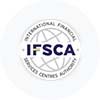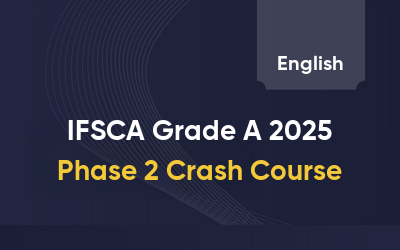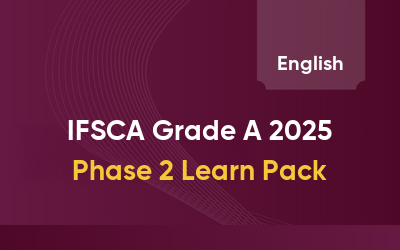IFSCA Grade A Syllabus: The IFSCA Grade A exam consists of three phases, and the syllabus outlines the complete subject-wise framework for candidates preparing for the Assistant Manager exam conducted by the International Financial Services Centres Authority. The syllabus is divided into Phase 1 and Phase 2, covering core areas such as English Language, Quantitative Aptitude, Reasoning Ability, General Awareness, and stream-specific subjects for the General, Legal, and IT streams. Understanding the detailed syllabus is the first and most important step toward a focused and effective preparation strategy for the IFSCA Grade A 2026 exam.
In this blog, we have provided the detailed IFSCA Grade A syllabus, along with the topic-wise syllabus for various streams such as General, IT, and Legal.
What is the syllabus for IFSCA Grade A Exam?
The IFSCA Grade A Exam 2026 syllabus covers key subjects such as General Awareness (with a focus on financial, economic, and regulatory updates), English Language, Quantitative Aptitude, Reasoning Ability, and stream-specific topics related to finance, economics, law, and IT. The IT stream also includes a qualifying coding test. The detailed syllabus will be released along with the official notification by the International Financial Services Centres Authority. Since Phase 1 and Phase 2 play an important role in the final selection, candidates should follow a well-planned preparation strategy. Below is the topic-wise breakdown of the IFSCA Grade A Syllabus 2026.
Attempt IFSCA Grade A Mock Test
What topics are included in the IFSCA Grade A phase 1 syllabus?
English Language, Quantitative Aptitude, Reasoning Ability, and General Awareness are the subjects included in the IFSCA Grade A Phase 1 Paper 1 syllabus. The topics included in the IFSCA Assistant Manager Syllabus 2026 for Phase 1 Paper 1 are given below.
| Subjects | Syllabus |
|---|
| English Language | 1. Reading Comprehension
2. Vocabulary
3. Synonyms & Antonyms
4. Fillers
5. Error Detection
6. Sentence Rearrangement
7. Word Swap
8. Idioms & Phrases |
| Quantitative Aptitude | 1. HCF and LCM
2. Simplification & Approximation
3. Quadratic Equation
4. Percentage
5. Ratio & Proportion
6. Profit & Loss
7. Time & Distance
8. Average
9. SI & CI
10. Mensuration
11. Problems on Trains
12. Mixtures & Allegation
13. Probability
14. Permutation & Combination
15. Indices and Surds
16. Partnership
17. Boats & Streams |
| Reasoning | 1. Arithmetical Reasoning
2. Puzzle
3. Direction Sense Test
4. Alpha Numeric Series
5. Logical Reasoning
6. Data Sufficiency
7. Venn Diagrams
8. Analogy
9. Clocks & Calendars
10. Coding Decoding
11. Passage Based Deriving Conclusions
12. Statement – Conclusions
13. Number, Ranking & Time Sequence
14. Statement – Arguments |
| General Awareness | 1. General knowledge
2. Current events of national and international importance
3. Economic and social development (sustainable development, poverty, inclusion, and demographics)
4. Commerce
5. Accountancy
6. Management
7. Finance and costing
8. Indian Economy
9. Global Economy
10. Five year plans
11. Central Government's initiatives/ Schemes in the financial sector |
Check IFSCA Grade A Exam Pattern
What is the IFSCA Grade A General stream syllabus 2026 for phase 1 paper 2?
The IFSCA Grade A General Stream Syllabus 2026 for Phase 1 Paper 2 covers key areas such as Economic and Social Development, Commerce and Accountancy, Management, Finance, Costing, Indian and Global Economy, along with current affairs and government financial initiatives. This paper tests candidates on both conceptual clarity and awareness of developments in the financial sector. Understanding the detailed syllabus will help aspirants prepare in a focused manner and improve their overall performance in the IFSCA Grade A 2026 exam.
| Subject | Detailed Syllabus |
|---|
| General Knowledge & Current Affairs | General knowledge; Current events of national and international importance |
| Economic and Social Development | (i) Growth and Development a) Measurement of growth: National Income and per capita income b) Poverty Alleviation and Employment Generation in India c) Sustainable Development and Environmental issues (ii) Social Structure in India a) Multiculturalism b) Demographic Trends c) Urbanization and Migration d) Gender Issues – Social Justice |
| Commerce and Accountancy | (i) Accounting as a financial information system (ii) Accounting Standards with specific reference to Accounting for Depreciation, Inventories, Revenue Recognition, Fixed Assets, Foreign Exchange Transactions, Investments (iii) Cash Flow Statement, Fund Flow Statement, Financial Statement Analysis, Ratio Analysis (iv) Accounting for Share Capital Transactions including Bonus Shares and Right Shares (v) Employees Stock Option and Buy-Back of Securities (vi) Preparation and Presentation of Company Final Accounts |
| Management | (i) Management: Nature and scope; Management Processes – Planning, Organization, Staffing, Directing and Controlling (ii) Role of a Manager in an Organization; Leadership and Tasks of a Leader (iii) Leadership Styles; Leadership Theories; Successful Leader vs Effective Leader (iv) Human Resource Development: Concept and Goals of HRD (v) Motivation, Morale and Incentives: Theories of Motivation; Managerial Motivation Techniques; Concept and Factors of Morale; Role of Incentives (vi) Communication: Steps in Communication Process; Communication Channels; Oral vs Written Communication; Verbal vs Non-verbal Communication; Upward, Downward and Lateral Communication; Barriers to Communication; Role of Information Technology (vii) Corporate Governance: Factors affecting Corporate Governance; Mechanisms of Corporate Governance |
| Finance | (i) Financial Systema) Role and Functions of Regulatory Bodies in the Financial Sector (ii) Financial Marketsa) Primary and Secondary Markets (Forex, Money, Bond, Equity, etc.) – functions, instruments, recent developments (iii) General Topics a) Basics of Derivatives: Forward, Futures, and Swap b) Recent Developments in the Financial Sector c) Financial Inclusion – use of technology d) Alternate Sources of Finance; Private and Social Cost-Benefit; Public-Private Partnership e) Direct and Indirect Taxes; Non-tax Sources of Revenue; GST; Finance Commission; Fiscal Policy; Fiscal Responsibility and Budget Management Act (FRBM) f) Inflation: Definition, trends, estimates, consequences and control measures; WPI, CPI – components and trends g) Financial Risk Management |
| Costing | (i) Overview of Cost and Management Accounting – Introduction, Objectives and Scope (ii) Methods of Costing – Single Output/Unit Costing, Job Costing, Batch Costing, Contract Costing, Process/Operation Costing, Costing of Service Sectors (iii) Basics of Cost Control and Analysis – Standard Costing, Marginal Costing, Budget and Budgetary Control(iv) Lean System and Innovation a) Introduction to Lean System b) Just-in-Time (JIT) c) Kaizen Costing d) 5S e) Total Productive Maintenance (TPM) f) Cellular Manufacturing / One-Piece Flow Production Systems g) Six Sigma (SS) h) Introduction to Process Innovation and Business Process Re-engineering (BPR) |
| Indian & Global Economy | (i) Demand and Supply; Market Structures; National Income – Concepts and Measurement; Classical and Keynesian Approaches; Determination of Output and Employment; Consumption Function; Investment Function; Multiplier and Accelerator; Demand and Supply for Money; IS–LM Model; Inflation and Phillips Curve; Business Cycles (ii) Balance of Payments; Foreign Exchange Markets; Inflation; Monetary and Fiscal Policy; Non-Banking Financial Institutions (iii) Role of International Financial Institutions – BIS, IOSCO, IMF, World Bank |
| Government Schemes | Central Government's initiatives and schemes in the financial sector |
Explore IFSCA Grade A Courses
What is the IFSCA Grade A General stream phase 2 paper 2 syllabus 2026?
The IFSCA Grade A General Stream Syllabus for Phase 2 Paper 2 focuses on advanced topics related to financial regulation, banking, capital markets, insurance, pensions, and global financial systems. This paper is objective in nature and tests candidates on their understanding of the IFSCA framework, Union Budget and Economic Survey, and the functioning of key financial institutions and markets. A clear understanding of this syllabus is essential for scoring well in the IFSCA Grade A 2026 exam.
| Topic | Detailed Syllabus |
|---|
| IFSCA & Global Financial Centres | IFSCA Act; IFSCA; IFSC; GIFT IFSC; GIFT City; Global Financial Centres |
| Union Budget & Economic Survey | Union Budget – concepts, approach, and broad trends; Economic Survey |
| Banking | (i) Structure and functions of financial institutions
(ii) Functions of Reserve Bank of India
(iii) Banking system in India – structure and developments; financial institutions – SIDBI, EXIM Bank, NABARD, NHB, NaBFID, etc.
(iv) Recent developments in the global financial system and its impact on the Indian financial system
(v) Role of information technology in banking and finance
(vi) Non-banking system
(vii) Developments in digital payments |
| Capital Market | (i) Role and functions of regulatory bodies in the financial sector
(ii) Primary and secondary markets (Forex, Money, Bond, Equity, etc.) – functions, instruments, recent developments
(iii) Basics of derivatives: Forward, Futures, and Swap
(iv) Spot and derivative markets of precious metals |
| Insurance | (i) History of Indian insurance; principles of insurance
(ii) Risk and uncertainty; pooling and diversification of risk; indemnity and insurable interest
(iii) Legal foundations of insurance; basics of group insurance, health insurance, and pensions; intermediation – role in mobilising savings; evolution of various types; bancassurance in India
(iv) Functions performed by insurers – product design, pricing, distribution, underwriting, claims, investment, and reinsurance
(v) Insurance lines and products – property-liability, life insurance and annuities, health insurance; liability risks and insurance; valuation and solvency requirements; specialist insurance lines in India – agricultural and export credit guarantee; reinsurance; GIC of India; obligatory cessions and retention of risk within the country |
| Pension Sector | (i) Status of the pension sector in India
(ii) Types of retirement schemes in India and their features
(iii) National Pension System (NPS)
(iv) Atal Pension Yojana (APY)
(v) Annuity plans
(vi) Basics of investment |
What is the IFSCA Grade A Legal stream syllabus for paper 2 in phase 1 and 2?
The IFSCA Grade A Legal Stream Syllabus for Paper 2 is divided into Phase I and Phase II, covering both foundational and advanced legal subjects required for the Assistant Manager role. Phase I focuses on core areas of constitutional, civil, commercial, and regulatory laws, while Phase II tests in-depth knowledge of criminal laws, corporate laws, trust law, and key financial and regulatory legislations under the IFSCA framework. Understanding this syllabus clearly helps candidates plan a phase-wise and structured preparation strategy for the IFSCA Grade A 2026 exam.
| Phase | Subject | Detailed Syllabus |
|---|
| Phase 1 | Constitution of India | Preamble; Part I; Part III; Part IV; Part IVA; Part V; Part VI; Part VIII; Part IXA; Part IXB; Part XI |
| Contract Laws | Indian Contract Act, 1872; Sale of Goods Act, 1930; Indian Partnership Act, 1932; Specific Relief Act, 1963 |
| Code of Civil Procedure, 1908 | Part I; Part II; Part III; Part IV; Part V; Part VII; Schedule I |
| Transfer of Property Act, 1882 | Chapter III; Chapter IV; Chapter V |
| Arbitration and Conciliation Act, 1996 | Part I and Part II (Enforcement of Foreign Award) |
| Administrative Law | Administrative Law |
| Jurisprudence & Interpretation of Statutes | Jurisprudence; Interpretation of Statutes |
| Legal Maxims | Important Latin terms and maxims |
| Torts & Consumer Protection | Law of Torts; Consumer Protection Act, 2019 |
| Special Economic Zone Act, 2005 | The Special Economic Zone Act, 2005 |
| Digital Data Protection Act, 2023 | The Digital Data Protection Act, 2023 |
| Right to Information Act, 2005 | The Right to Information Act, 2005 |
| Mediation Act, 2023 | The Mediation Act, 2023 |
| Intellectual Property Rights | Intellectual Property Rights – Basic concepts |
| Phase 2 | Criminal Laws | Bharatiya Nyaya Sanhita, 2023 (Chapters I, II, III, IV, VII, XII, XVII, XIX); Bharatiya Nagarik Suraksha Sanhita, 2023 |
| Law of Evidence | Bharatiya Sakshya Adhiniyam, 2023 |
| Corporate & Trust Laws | Companies Act, 2013; Limited Liability Partnership Act, 2008; Insolvency and Bankruptcy Code, 2016 (Part I, Part II); Law of Trusts – Principles of trust, parties to a trust deed, and duties of trustees |
| IFSCA & Financial Regulatory Laws | IFSCA Act and the following Acts: 1. Reserve Bank of India Act, 1934 2. Insurance Act, 1938 3. Banking Regulation Act, 1949 4. Securities Contracts (Regulation) Act, 1956 5. Deposit Insurance and Credit Guarantee Corporation Act, 1961 6. Securities and Exchange Board of India Act, 1992 7. Depositories Act, 1996 8. Insurance Regulatory and Development Authority Act, 1999 9. Foreign Exchange Management Act, 1999 10. Credit Information Companies (Regulation) Act, 2005 11. Payment and Settlement Systems Act, 2007 12. Pension Fund Regulatory and Development Authority Act, 2013 13. Factoring Regulation Act, 2011 |
What is the IFSCA Grade A Information Technology stream syllabus for paper 2 (common for both phases)?
The IFSCA Grade A Information Technology Stream Syllabus for Paper 2 is common for both Phase 1 and Phase 2 and is designed to test candidates on core technical concepts required for the Assistant Manager role. The syllabus covers a wide range of topics including databases, programming, data analytics, algorithms, networking, cyber security, data warehousing, shell programming, and AI/ML. A clear understanding of this detailed syllabus will help aspirants plan their preparation effectively and focus on both conceptual clarity and practical application.
| Topic | Detailed Syllabus |
|---|
| Database Concepts | ER-model; Relational model: relational algebra, tuple calculus; Integrity constraints; Normal forms; File organization; Indexing (e.g., B and B+ trees); Transactions and concurrency control |
| SQL Queries | Select; View; Truncate; Delete; Update; Alter; Inner join; Different types of outer joins; Use of aggregate functions; Union; Intersection; Except; IN and EXISTS clauses; Nested queries |
| Programming Concepts (Java / C / C++) | Program control (iteration, recursion, functions); Scope of variables; Binding of variables and functions; Parameter passing; Functional and Logic Programming; OOPS concepts; Inheritance; Class and object; Constructors; Functions; Exception Handling |
| Data Analytics Languages (Python / R) | Regex; Slicing; Data reshaping; DataFrames; Dictionaries and Sets; File Management; Classes and Functions; Data Mining; Lists; Importing and exporting data; Charts and graphs |
| Algorithms for Problem Solving | Tree and graph traversals; Connected components; Spanning trees; Shortest paths; Hashing; Sorting; Searching; Design techniques – Greedy, Dynamic Programming, Divide and Conquer |
| Networking Concepts | ISO/OSI stack; LAN Technologies (Ethernet, Token Ring); TCP/UDP; IP; Basic concepts of switches, gateways, and routers; Application layer protocols (DNS, SMTP, POP, FTP, HTTP); Firewalls |
| Information & Cyber Security Concepts | Cyber attacks; Software Development Security; Network security; Authentication; CIA – Confidentiality, Integrity and Availability; Network audit; Systems audit |
| Data Warehousing | Data Extraction; Data Cleaning; Data Transformation; Data Loading; Metadata; Data Cube; Data Mart; Data Models |
| Shell Programming | Shell scripting basics; Shell variables; Shell script arguments; If statement; Loop; Return; Basic UNIX commands |
| Artificial Intelligence & Machine Learning (AI/ML) | Machine Learning basics; Supervised learning; Unsupervised learning; Data preprocessing; Model evaluation; Linear regression; Logistic regression; Decision trees; Clustering; Feature engineering; Python for ML; TensorFlow; PyTorch; Scikit-learn; NLP; Sentiment analysis; Neural networks; Overfitting and underfitting; Cross-validation; Reinforcement learning; Cloud AI services; Deployment basics |
IFSCA Grade A Exam Pattern 2026
The IFSCA Grade A Exam 2026 will be conducted in three phases: Phase 1 (Preliminary Exam), Phase 2 (Main Exam), and Interview. Each phase is designed to evaluate the candidate's knowledge, reasoning ability, analytical skills, and understanding of subjects relevant to international financial services. For candidates applying under the IT stream, there is an additional qualifying coding test included as part of the selection process.
| Phase | Paper | Type | Duration | Marks | Subjects |
|---|
| Phase 1 (Preliminary Exam) | Paper 1 | Objective | 60 minutes | 100 | General Awareness (with emphasis on Financial Sector), Quantitative Aptitude, Reasoning Ability, English Language |
| Paper 2 | Objective | 60 minutes | 100 | Stream-specific subjects (General, Legal, or IT) |
| Phase 2 (Main Exam) | Paper 1 | Descriptive | 60 minutes | 100 | English Writing Skills: Essay, Precis, Comprehension |
| Paper 2 | Objective | 60 minutes | 100 | Stream-specific advanced subjects (General, Legal, or IT) |
| IT Stream Qualifying Test | – | Coding Test | – | Qualifying only | For IT stream candidates only |
| Interview | – | Personal Interaction | – | – | Based on Phase 2 performance |
Key Updates:
- IT Stream Added: Includes a qualifying coding test.
- Phase 1 & Phase 2 papers: 100 marks each, 60 minutes per paper.
- Stream-specific subjects clearly divided as General, Legal, and IT.
- Final selection is based on Phase 2 marks (85%) + Interview marks (15%), while Phase 1 is only for shortlisting.
Download IFSCA Grade A syllabus PDF
Candidates preparing for the IFSCA Grade A Exam 2026 should download and go through the official syllabus PDF to understand the exact exam structure and subject-wise topics prescribed by the International Financial Services Centres Authority (IFSCA). The syllabus PDF includes detailed coverage of phase 1 and phase 2, across General, Legal, and Information Technology streams, and helps aspirants plan their preparation in a focused and exam-oriented manner. The direct link to download the IFSCA Grade A syllabus PDF is provided below.
Download the IFSCA Grade A Syllabus PDF





















































































